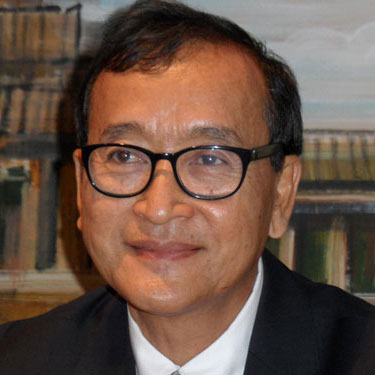When I resigned from the leadership of the Cambodia National Rescue Party (CNRP) in February 2017, to hand over to deputy leader Kem Sokha, I did not know that I was handing him a poisoned chalice.
He was arrested at his house later that year on Sept. 3 and spent a year in prison under hard conditions. Stripped of his political rights, he was later put under house arrest for more than a year before being allowed a kind of semi-freedom which continues to this day. He is still awaiting a verdict in his case for “sedition” and “treason”.
To try and avoid the dissolution of the CNRP, I had to give up the leadership of the party as I knew that Prime Minister Hun Sen was going to amend the electoral law to directly and personally target me. This amendment was voted through by a rump national assembly on February 20, shortly after my resignation on February 11. The amendment forbade anyone who had been convicted by the country’s courts from leading a political party, on pain of the dissolution of this party. It was targeted at me as a “convict” living outside Cambodia whom the authorities were unable to arrest.
The made-to-measure nature of the amendment is clear in the context of Hun Sen having had me condemned in advance and in absentia by a politically controlled court to long prison terms on politically motivated charges.
Any pretext to eliminate the opposition
My resignation did not in fact help because Hun Sen had decided to dissolve the CNRP in any event. He was prepared to invent any pretext to avoid having to compete with this party.
The CNRP represented, for the first time in Cambodia’s modern history, a united democratic opposition, the electoral success of which seriously threatened the regime. The party scored 44% of the votes in the legislative elections of July 2013 and achieved the same score in local communal elections in June 2017. This was despite the serious electoral irregularities which favoured the ruling party, as noted by all independent observers.
The June 2017 local vote was particularly worrying for Hun Sen because the opposition score in a local election would normally be lower than that achieved in the previous national election. This was the final vote in which the CNRP participated. It showed that the party had developed extensive local roots in a very short time. This undermined the formerly communist ruling party, whose networks control the population down to the level of the smallest village.
Having “got rid” of me, Hun Sen turned to the CNRP’s leader Kem Sokha. There was no court conviction against him to enable the amendment to the electoral law to be used. So an invented conviction was needed. Kem Sokha was arrested and was confronted with astonishing accusations of “sedition” and “treason”. The accusations were made at the last minute, based on a grotesque reading of a standard speech he had made four years earlier in Australia.
Hun Sen strained to go even faster than even his own rules allowed. On Nov. 16, two months after Kem Sokha’s arrest, Hun Sen had the CNRP dissolved, using the pretext that an accusation had been made against its leader, though there had been no trial and no verdict. Hun Sen urgently had to eliminate the CNRP at all costs with legislative elections approaching in July 2018. The result was that, without a real opposition, his ruling party won 100% of the seats in the July 2018 elections.
Kem Sokha remains key
The ongoing treatment of Kem Sokha to the present day risks ruining everything for Hun Sen. His trial for an “attempt to overthrow the government with the support of the United States” has been dragging on for more than five years. This is like a bone stuck in Hun Sen’s throat which obliges him to show his real face as a dictator without scruples.
Kem Sokha’s trial can’t move forward, in the absence of any serious evidence. Neither can it be abandoned, because to acquit Kem Sokha by withdrawing the fabricated charges made against him would mean the rehabilitation of the CNRP, which could then participate in the next legislative elections on July 23, 2023. Such a re-awakening of the CNRP is a living nightmare for Hun Sen.
Acquitting Kem Sokha and rehabilitating the CNRP are the two inseparable components to solving Cambodia’s political crisis. These are the only steps which would respect democratic principles and give justice to a man who has become a symbol for Cambodian aspirations for freedom. That is why representatives of democratic countries put such high importance on meeting Kem Sokha, to the dismay of Hun Sen, whenever they are in Phnom Penh.
German president Frank-Walter Steinmeier insisted on meeting Kem Sokha during his stay of a single day in Phnom Penh on Feb. 15. US Secretary of State Antony Blinken, the EU’s second-highest ranking leader Josep Borrell Fontelles and Australian Foreign Affairs Minister Penny Wong have done likewise in recent months.
By sending its most senior diplomats to regularly meet a man who has been unjustly persecuted but who remains a symbol in the struggle for democracy, the West is implicitly signalling to Hun Sen that the coming Cambodian elections won’t be legitimate without the participation of the CNRP and its leader Kem Sokha.
Even though he still does not have his political rights and is officially banned from all political activities, Kem Sokha is still a key figure due to his leadership of the CNRP, a party which represents a great political force which Hun Sen cannot abolish with the stroke of a pen.
[Image credit: Kem Sokha’s Facebook page]
The views expressed in this article are those of the author.

Sam Rainsy, Cambodia’s finance minister from 1993 to 1994, is the co-founder and acting leader of the opposition Cambodia National Rescue Party (CNRP).

